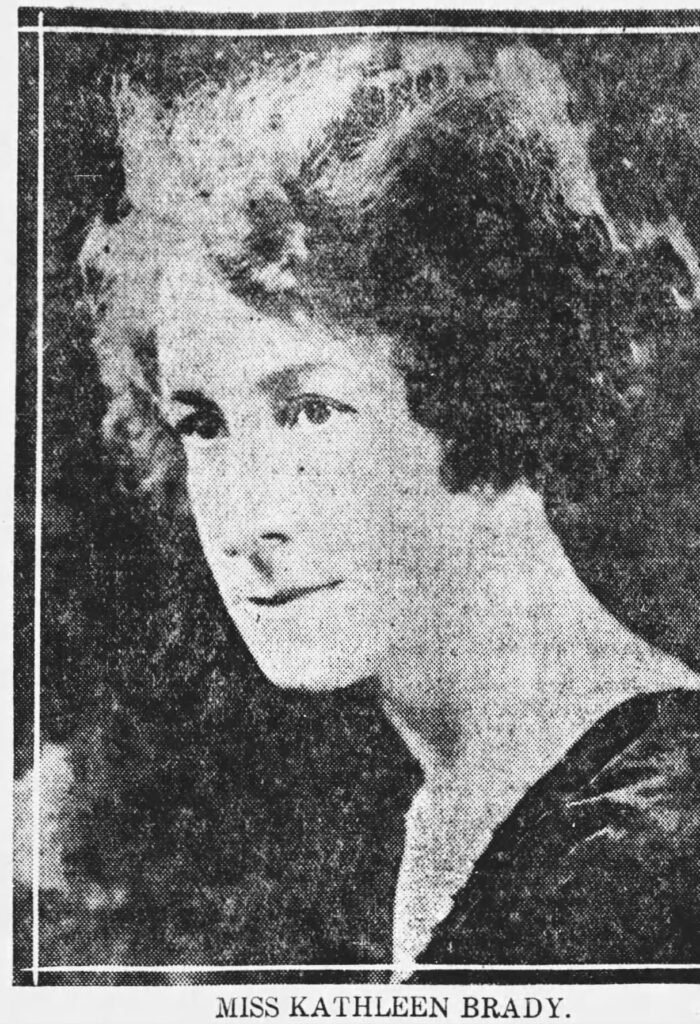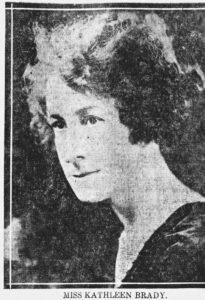
There was no Treaty between Ireland and England…a Treaty
implies equality between contracting parties…in the so-called Treaty of
1921, one of the parties is made completely subservient to the other”.
Quote from a speech given by Kathleen Brady at the Butte Broadway
Theater on December 10,1923. She was referring to the recently passed
Irish Free State Treaty, which she believed did not provide Irish
independence from England.
Hello, this is John Conlan, host of the Rocky Road to Dublin here on
KBMF and welcome to this episode of The Harp Without the Crown,
where I will be discussing the visit of Kathleen Brady to Butte, Montana in
December 1923.
Kathleen Brady was born in Belfast and became interested in the Irish
independence movement by joining the Cuman na mBhan in 1915. This
organization was considered to be a radical womens group committed to
Irish independence. While in medical school, Kathleen became interested
in raising money for a Relief Fund for Irish prisoners jailed by the British
government. This Fund would also aid the dependents of the prisoners.
Commitment to this cause led her to serve in 1919 as President of the
Belfast Prisoner’s Fund.
A few years later she was arrested and jailed for transporting men and
guns during the Four Courts takeover by anti-Free State Treaty forces in
June of 1922. The Four Courts is home to many of Ireland’s major legal
and judicial buildings and the occupation was considered to be the start of
the Irish Civil War which lasted for two years.
Members of the Irish Volunteers and Irish Republican Army occupying
the Four Courts complex hoped the occupation would bring down the
Free State government. The Treaty was viewed by these fighters and
supporters, like Kathleen Brady, as an affront to those who died in the
1916 Easter Rising. Complete Irish independence was their goal and
physical force was the means to obtain that goal.
Kathleen Brady supported and participated in the occupation and was
eventually captured, and as previously mentioned, jailed for gun running
and transporting Irish Volunteers. She served time in Dublin’s
Kilmainham Jail and escaped after a few months. Just one year and a
half later she was in Anaconda and Butte describing her experiences in
Ireland.
Kathleen arrived in Butte during December 1923 with Peter Golden, a
poet, scholar, National Secretary of the American Association for the
Recognition of the Irish Republic, and Secretary of the Irish Progressive
League. As with most Irish activists that visited Montana, their speeches
targeted audiences in Anaconda and Butte. Anaconda, their first
speaking engagement, Kathleen and Peter Golden addressed a packed
audience at the Anaconda AOH building. Newspapers noted the address
took place in front of one of the largest audiences ever held at Hibernia
Hall.
The speakers were sponsored by the Anaconda Branch of the
American Association for the Recognition of the Irish Republic. This
organization was considered to be one of the more active fundraising
Irish-American organizations, especially for Irish Relief programs. The
Anaconda audience contributed $720 for Irish Relief programs. This
amount has the purchasing power of over $13,000 in 2024.
The next night at the Butte Broadway Theater, Kathleen Brady was
introduced to the audience as “one of the biggest little women in the fight
for Irish freedom.” Newspaper accounts referred to her as a leading
expert on the political and economic conditions in Ireland. The importance
of her presence was underscored by the attendance of the Governor of
Montana, Joseph Dixon, a Republican leader of the Progressive
Movement in Montana and fierce opponent of the Anaconda Copper
Mining Company.
Both Kathleen and Peter Golden spoke on the topic of “Irish Relief”
which detailed dire economic conditions in Ireland. Kathleen emphasized
the importance of supporting Irish Relief Programs and the people who
share a cultural and social history with the people of Butte. Her speech
detailed the plight of the 20,000 Irish prisoners held in British prisons for
their participation in various rebellions against the British Empire. Both
speakers also detailed how this imprisonment impacted prisoners’
families and highlighted their need for monetary support. Approximately
$4,000 was collected that night in Butte for Irish Relief programs. This
amount has the purchasing power of over $73,000 in 2024.
Although the main focus of her visit was to advocate for Irish Relief
Programs, Kathleen always saved much of her talk to condemn the Irish
Free State Treaty which passed in 1921. Kathleen, like many of the Irish
social activists and politicians who came to Butte, saw the Treaty as a
failure because it did not provide complete independence from England.
Kathleen Brady was actively involved in the “physical force” camp that
advocated armed rebellion to obtain Irish independence. Most
importantly, she was one of the many Irish men and women who brought
their message to Butte and viewed the Irish Free State Treaty as a failure.
Her remarks emphasized that Ireland’s freedom would be won through
the efforts of the people who joined the armed forces-who were willing to
lay down their lives for freedom.
Kathleen Brady’s visit served two important purposes. First, she
raised significant amounts of money for the Irish Prisoner’s Relief Fund,
which helped keep the brutal imprisonment of Ireland’s rebellious leaders
in the news and minds of the Butte Irish. Secondly, by appearing in Butte,
Kathleen Brady followed the many Irish activists and politicians that
brought their message of hope for an independent Ireland to Butte.
These visitors recognized the importance of the Butte Irish community
and its role in aiding the Irish independence movement. The result was
that Butte shared the stage with the larger Irish-American communities of
New York, Boston, and Chicago. These visits served to keep the goal of
Irish independence and the sacrifices made by the heroes of the Easter
Rising alive in the hearts and minds of the Butte and Anaconda
Irish-American communities.
This is John Conlan and thanks for listening to this episode of The
Harp Without the Crown.

